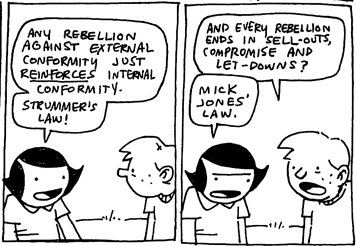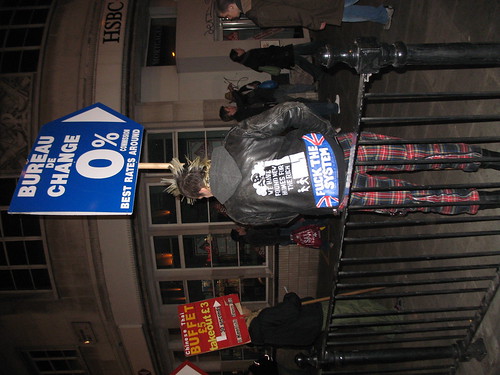The Null Device
Posts matching tags 'rebellion'
2008/1/8
As France's right-wing bête noire president Nicolas Sarkozy's image is softened by his romance with an ex-model, his son, a hip-hop producer under the name "Mosey", is working with militantly political rappers from the banlieues, including a rapper named Poison (of no relation to the 1980s hair-metal band):
Mr Sarkozy, as Interior Minister, ordered the prosecution of half a dozen rappers for insulting the police and became their bête noir with his drive to “clean out the layabouts” from the estates. His creation of a Ministry of National Identity further fired the anti-Sarko ire of the rap world.
“I’m not a Sarkozy guy, I don’t give a s***,” said Poison, whose name is pronounced the English way. “The guy brought me some music. He does good sh**. I didn’t know at the start that it was the son of Sarko. When I found out, I blew a fuse and phoned him. He said ‘Yeah, but Poison, I didn’t wanna tell you ‘cos you wouldn’t wanna hang out wid me no more’. I told him, hey, no problem. You never done me wrong. We’ll bust nobody’s balls, we’ll just do good stuff.” In an anti-Sarkozy video with other rap singers last year, Poison chanted: “Anti-Sarko, anti-right, Nicolas don’t you hear. We’re anti-you.”I wonder whether Poison's working relationship with Mosey, or his status in the French hip-hop underground, will survive the publicity; I suspect something may have to give.
2007/7/13
In Poland, where the mainstream culture is dominated by a conservative, nationalistic monoculture, more often than not with an anti-Semitic streak, rebels, refuseniks and rootless cosmopolitanists are embracing all things Jewish. Klezmer bands (comprised mostly of non-Jewish musicians) are forming everywhere, people are taking classes in everything from Hasidic dancing to Hebrew calligraphy, and replicas of 1930s-vintage Jewish merchants' signs are cropping up all over Krakow streets like some kind of theme park:
Interest in Jewish culture became an identifying factor for people unhappy with the status quo and looking for ways to rebel, whether against the government or their parents.
"The word 'Jew' still cuts conversation at the dinner table," Gebert said. "People freeze."
The revival of Jewish culture is, in its way, a progressive counterpoint to a conservative nationalist strain in Polish politics that still espouses anti-Semitic views. Some people see it as a generation's effort to rise above the country's dark past in order to convincingly condemn it.Not everybody's pleased with this:
Many Jews are offended by the commercialization of their culture in a country almost universally associated with its near annihilation.
Others argue that there is something deeper taking place in Poland as the country heals from the double wounds of Nazi and communist domination. "There is commercialism, but that is foam on the surface," Gebert said. "This is one of the deepest ethical transformations that our country is undergoing.Perhaps we can expect to see a new wave of klezmer-punk bands emerging from Krakow any day now?
2006/12/8
2006/8/18
As alternative-rock fans age and, in many cases, start families, a US company has brought out lullaby versions of alternative rock songs. Hip parents can now soothe their kids to sleep with mellow, ambient renditions of Metallica, The Cure, Tool, Radiohead and such played on glockenspiels and acoustic guitars (or, indeed, Coldplay, who for some reason are still classified as "alternative" (presumably because of their shaggy indie-boy haircuts or something) rather than filed next to Dido, Celine Dion and James Blunt in the adult-contemporary section). Yesteryear's teen rebellion becomes today's nursery music.
Lullaby. A whisper. The Cure's music is just like heaven to their fans. Beautiful, infinite and captivating, The Cure's best work captures a dreamy sense of love and longing. This album is a mesmerizing and serene take on the kind of quirky, romantic songs that the Cure helped make famous. If only tonight we could sleep as soundly as your child will after hearing these interpretations of The Cure.
I wonder what else we could see get the lullaby treatment. Nine Inch Nails perhaps, or Limp Bizkit? NWA? 90s rave techno? Perhaps this phenomenon will cross over with Nouvelle Vague, giving post-punk parents baby-friendly versions of the Buzzcocks and Bauhaus and such.
(via Boing Boing) ¶ 2
2006/8/12
Frank Broughton, co-author of Last Night A DJ Saved My Life, writes about how the Nazis were responsible for disco, or more precisely, how the peculiar phenomenon of dancing to records in cellars originated with a subculture of French kids who defied the Nazis' bans on jazz and swing, dressed up in ostentatious costumes and called themselves les Zazous.
Imagine, amid the grey serge of wartime France, a tribe of youngsters with all the colourful decadence of punks or teddy boys. Wearing zoot suits cut off at the knee (the better to show off their brightly coloured socks), with hair sculpted into grand quiffs, and shoes with triple-height soles - looking like glam-rock footwear 30 years early - these were the kids who would lay the foundations of nightclubbing. Ladies and gentlemen, les Zazous.
The Zazou look was completed with high collars, impossibly tight ties and long sheepskin-lined jackets, with a curved-handled umbrella carried at all times (copied from British prime minister Neville Chamberlain, regarded as quite a style icon). Female Zazous wore short skirts, shabby furs, wooden platform shoes and dark glasses with big lenses, and chose to go hatless, to better show off the single lock of hair they had bleached or dyed. They took their name from the Cab Calloway-style scatting in a song Je Suis Swing, by their hero, French jazz singer Johnny Hess.
As the pogroms began, some Zazous went even further and took to wearing yellow stars of David to show solidarity with the Jews. To underline their outlaw musical taste, they wrote "swing" across them. Several found themselves in internment camps as a result. Even stranger, when liberation was imminent, female Zazous blacked up their faces to show their love for jazz and America.
2006/1/22
2006/1/21
The latest rebranding of Jesus Christ makes him a black revolutionary in Africa:
Instead of robes and homilies about turning the other cheek, this Jesus wears jeans and T-shirts and urges supporters to resist - peacefully - a tyrannical regime in an unnamed southern African country which resembles Zimbabwe. A collaboration between Spier films and the Dimpho Di Kopane, a theatre and film ensemble, the feature, made in South Africa, was shot in rural Eastern Cape and in Khayelitsha, a township outside Cape Town plagued by poverty and crime.
Son of Man, directed by Mark Dornford-May, depicts Jesus as a divine being who performs miracles. But it may prove contentious for switching the story from Roman-occupied first-century Palestine to misruled 21st-century Africa. "He gathers people around him to fight against poverty and political oppression," said Pauline Malefane, who plays Mary. "It feels a bit like apartheid, people living in fear that soldiers could come into the house at any time and kill children."Compare and contrast with the hip Jesus-as-Che/Mao icons that evangelical groups around the world have been using in recent years.
2003/1/17
Thomas Frank on the corporatisation of cool, on how ersatz "rebellion" (and ersatz "authenticity") is the engine of consumerism, and the false hip-square dichotomy created by advertising:
So it offers not just soap that gets your whites whiter, but soap that liberates, radios of resistance, carnivalesque cars and counter-hegemonic hamburgers.... If our fragmented society has anything approaching a master narrative, it is more of a master conflict. We are in constant struggle - not against communism, but against the spirit-crushing, fakeness-pushing power of consumer society. And we resist by watching Madonna videos or by consorting with more authentic people in our four-wheel-drives, or by celebrating consumers who do these things.
People worked harder and longer in the '90s than in previous decades; they saw more ads on more surfaces than before; they ran up greater household debts; they had less power than at any time in the past 50 years over the conditions in which they lived and worked. In such an environment our anger mounted. And from the eternally outraged populist right to the liberation marketers of Madison Avenue, those who prevailed in the past decade have been those who learnt to harness this anger most effectively.
2001/4/30
"Baile funk", the ultra-violent musical gang warfare scene from the slums of Brazil, is now headed for the US, with funk band Bonde do Tigrao embarking on their Stateside tour.
"I'm going to show you that I'm a tiger/I'm going to put on the pressure/And then hammer, hammer, hammer," Bonde do Tigrao chant on their most popular song, a mixture of rap and pop.
You know, that sounds, like a Prodigy lyric...
(I wonder whether Dr. Dre or someone from Interscope is taking notes; once the mook thing runs out of steam, Brazilian-style funk may be the Next Big Thing.) (via Robot Wisdom)

